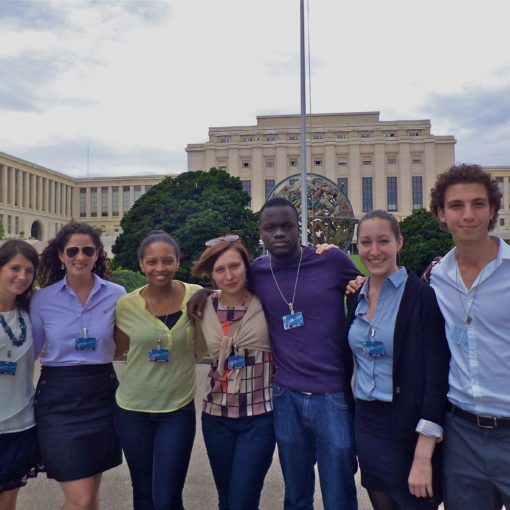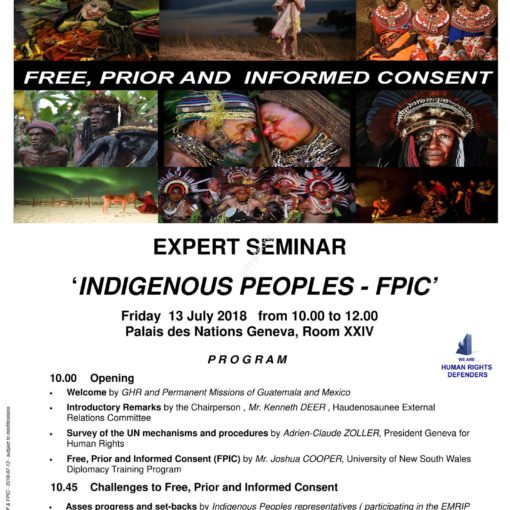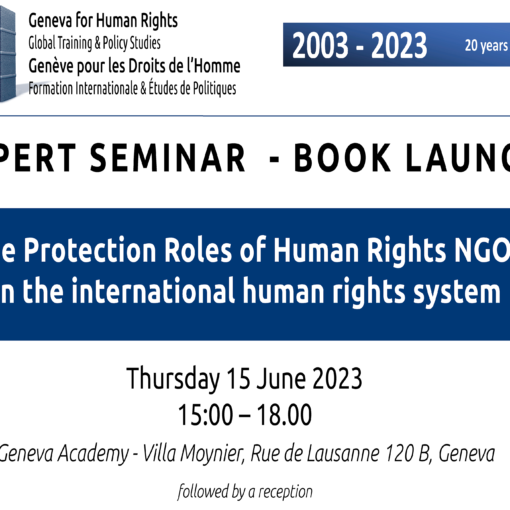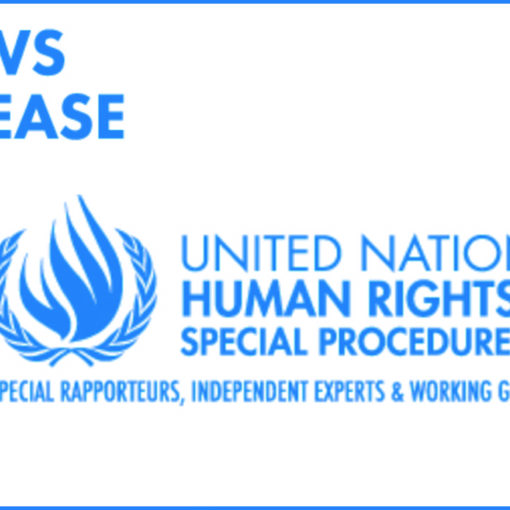
Human Rights Year 2017 – Foreword Annual Report 2017
Many human rights principles, declarations, and conventions have been adopted by the United Nations (UN) and other inter-governmental organizations, such as the International Labour Organisation, UNESCO, and regional organisations. Many monitoring mechanisms and procedures have been set-up. In spite of this, the international human rights system remains weak. It lacks effective implementation. As we celebrate the 70th Anniversary of the Universal Declaration on Human Rights (UDHR), let us recall that the implementation of human rights and the follow-up to UN recommendations and decisions depend on each country: not the UN, but the States have to realize human rights. To bridge the gaps between UN standards and the realities, Geneva for Human Rights (GHR) focuses its training activities on developing national capacities.
Progress in the UN is generally slow. End 1947, following resolutions of the UN General Assembly and of the Economic and Social Council (ECOSOC), the Commission on Human Rights created three Working groups to draft the first human rights documents, one on a declaration, one on a convention, and one on implementation. One year later, the draft Declaration was finalized, and adopted in Paris (10 December 1948). For the convention, it took 18 more years to the UN Assembly to adopt the International Covenants on Economic, Social and Cultural Rights and on Civil and Political Rights (16 December 1966).
Gradually, several treaty monitoring mechanisms were set-up by several human rights conventions creating Committees to review the implementation by States parties.
More delicate was the reaction to serious human rights abuses committed by the member States. From 1947 to 1967, the rule was the ‘no power’ doctrine: the Commission had ‘no power to take any action in regard to complaints regarding human rights’ [1]. Finally, in June 1967, the ECOSOC gave the Commission and its expert body, the Sub-Commission, the authority to ‘examine information relevant to gross violations of human rights’, and in certain situations, to take action concerning complaints in the field of human rights [2]. And, in May 1970, ECOSOC adopted the main provisions for a confidential complaint procedure [3].
Increasingly, country situations were raised and referred to in debates of the Sub-Commission, the Commission and the ECOSOC. The difficulty remained to take effective action, namely to obtain a majority in the superior UN bodies on country resolutions. The first initiatives came from the South. With India in the lead, long before the public and confidential procedures were established, the UN had made a first exception to the principle of non interference for South Africa and its Apartheid policy’ [4]. Later, at the initiative of Arab States, the Assembly established a Special Committee to Investigate Israeli Practices Affecting the Human Rights of the Population of the Occupied Territories (December 1968). And, at the request of the Assembly, the Commission on Human Rights appointed in February 1975 an Ad Hoc Working group to inquire into the situation of human rights in Chile. Since then, the Commission, and currently the Human Rights Council, adopted each year dozens of country resolutions, often with a monitoring mechanism in the form of a Working group or a Special Rapporteur, and, today, sometimes with a Commission of Inquiry.
A majority to condemn Argentina could not be reached. The Commission therefore created a procedure on the main pattern of abuses committed in Argentina, on enforced or involuntary disappearances (1980). It was the first UN thematic procedure. Since then, year after year, the Commission added other thematic procedures. There are currently 44 thematic procedures, most of them being entrusted to one single expert.
The creation of this system is largely due to the work of NGOs, victims and defenders, who submitted first-hand information, advocated the creation of new procedures and used the new procedures to denounce the violations. Several courageous initiatives and stands from the UN Secretariat were also critical. Another main actor was the Sub-Commission, whose experts prepared high quality reports, most of them being at the origins of UN declarations, conventions and procedures. Involved in the first stages of the confidential procedure, the Sub-Commission also adopted during the 90s resolutions on many countries.
Not surprisingly, States directly affected multiplied initiatives to weaken a system which was unanimously confirmed at the 1993 World Conference. The first aim of hardliner States was to obtain the dismissal of a Director for human rights, to silence the Sub-Commission experts, as they could not control them. The Sub-Commission was ordered no longer to adopt country resolutions, and later, not to adopt thematic resolutions mentioning countries. This will of the States to avoid the Sub-Commission’s scrutiny on human rights abuses strongly influenced the suppression of the Sub-Commission, when the Human Rights Council was created, and its replacement by a group of experts, who would only make studies, and only at the request of the Council.
The second target was, and still is, to oppose country resolutions in the UN bodies, and to weaken the thematic procedures. A code of conduct was introduced for the Rapporteurs (… instead of a code for the violators …).
The third practice was targeting the messengers, victims and witnesses, their defenders and human rights organizations submitting reports and complaints. Reprisals against those contributing to the UN procedures became a practice all over the world.
We start our Annual Report with this reminder of a dark reality, to explain the broadening of our action: we cannot teach the use of international procedures without joining efforts to preserve and reinforce these procedures. We cannot continue to train defenders who become potential targets from repressive States without protecting them. We therefore wish to be actively involved in the current reform of the Human Rights Council and of the Treaty Bodies.
February 2018
Adrien-Claude Zoller, President
[1] ECOSOC Resolutions75 (V) and 76 (V), 5 August 1947.
[2] ECOSOC Resolution 1235 (XLII) of 6 June 1967,
[3] ECOSOC Resolution 1503 (XLVIII) of 27 May 1970.
[4] General Assembly Resolution 616 A (VII) creating the Commission of Three, 5 December 1952.




